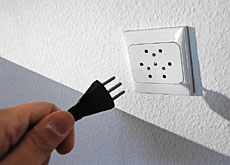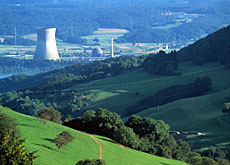Energy debate reignites in parliament

For the second time in recent years, the debate about the liberalisation of the Swiss power market takes centre stage in parliament.
Trade unions and the centre-left Social Democrats are pitted against the other main parties and the business community.
During the first week of the regular autumn session, the House of Representatives is due to launch a debate in the latest stage of an ongoing row about the opening up of the Swiss power market.
In 2002, the Swiss electorate rejected proposals to liberalise the electricity supply in a nationwide vote.
Even before the new discussions in parliament begin, battle lines are being drawn. The centre-right and rightwing parties, supported by the Swiss Business Federation and the leading power producers, want an immediate liberalisation.
The Federation of Trade Unions, which mounted the successful challenge against the first proposal, and the Social Democrats favour a staggered opening up of the market.
They are campaigning for cautious, two-stage liberalisation, which should only apply to the big providers at first.
Monopoly
The power supply law aims to lay the framework for the liberalisation of the Swiss electricity market. Currently regions have their own, partly state-controlled power suppliers each with their own supply monopoly.
Under the draft law consumers should be able to choose their supplier from 2007, as is currently the case in the telephone market.
Such a change would bring Swiss legislation closer into line with that of the European Union, which also wants to introduce consumer choice.
The government says that the general conditions for electricity supply in Switzerland have changed over the past few years.
It points out that the Federal Court recognised the right to third-party network access in June 2003, and that the significance of the cross-border electricity trade has increased.
Switzerland, as a European power hub, could not stand apart as the internal EU electricity market has become more developed, and all end-users will be able to choose their supplier freely by 2007, the government argues.
Public service
The unions say the power-supply market works well in Switzerland and international price comparisons are favourable. They have also accused the centre-right parties of trying to override a decision by Swiss voters three years ago.
Rejection of the first electricity law was recognition that the people were against the dismantling of an important public service, the unions argue.
Proponents of the new law point out that the 2002 version has essentially been improved upon, especially for smaller operators. They add that the interests of the Left are also incorporated in a clause which calls for the promotion of specific renewable-energy sources.
The law allows for SFr165 million ($130.5 million) per year to be used to encourage domestic production of renewable energy.
The aim is for this type of energy production to provide ten per cent of the country’s energy needs by 2030.
swissinfo, Christian Raaflaub
The proposal for the liberalisation of the energy market has been separated into three parts:
Power supply law, which lays down the framework for the opening up of the power market.
Electricity law relates to international power transport and EU-guidelines.
Energy law includes measures for the promotion of renewable energy.

In compliance with the JTI standards
More: SWI swissinfo.ch certified by the Journalism Trust Initiative












You can find an overview of ongoing debates with our journalists here . Please join us!
If you want to start a conversation about a topic raised in this article or want to report factual errors, email us at english@swissinfo.ch.